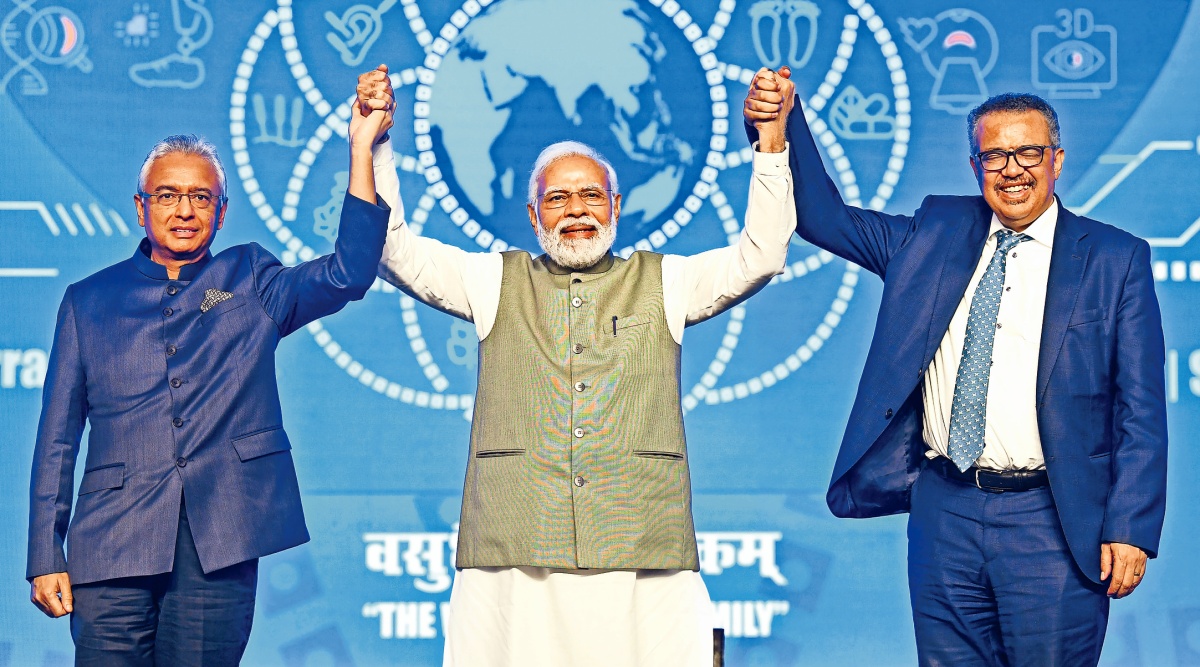 PM Narendra Modi with Mauritius PM Pravind Jugnauth and WHO DG Tedros Ghebreyesus in Jamnagar. Chirag Chotaliya
PM Narendra Modi with Mauritius PM Pravind Jugnauth and WHO DG Tedros Ghebreyesus in Jamnagar. Chirag Chotaliya Noting the rising demand for Ayurveda, Siddha, Unani formulations globally since many countries are turning to traditional medicine to deal with the pandemic, Prime Minister Narendra Modi Tuesday said testing and certification of traditional medicine at the WHO Global Centre for Traditional Medicine (GCTM) in Jamnagar must conform to international standards.
The Prime Minister, speaking at the ground breaking ceremony of the GCTM in the presence of Mauritius Prime Minister Pravind Kumar Jugnauth and WHO Director-General Dr Tedros Ghebreyesus, said that in the next 25 years, by the 100th year of India’s independence, “every household will rely” on traditional medicine.
He said the GCTM should establish a “global repository” of traditional medicine practices across the world. This, he said, will aid the “coming generations”.
“The WHO has established a new partnership with this centre of traditional medicine, which respects India’s potential and contribution. India is taking this as a huge responsibility and will aid in giving better medical solutions to people of the world.”
“For testing and certification of traditional medicine, GCTM must conform to international standards… This way the trust on TM drugs will also increase. We see many TM drugs and products of India finding influence among foreigners. But due to lack of international standards (of quality testing and certification), regular trade (of such drugs and products) remains restricted,” he said.
Emphasising that overall well-being has a “direct relationship” with balanced diet and that wellness should be the “ultimate goal” — it’s finding resonance following the Covid-19 pandemic with the world searching for “new healthcare delivery systems” — Modi said: “Jamnagar will reach new heights in the wellness sector with this centre”.
Stating that India’s practice of traditional medicine has not been limited only to treatment but is about life’s holistic science, he said: “Apart from treatment and relief, there are other aspects that include social health, mental health, happiness, environmental health, sympathy, empathy etc which are part of holistic well-being. Ayurveda is known as the fifth Veda.”
“The new diseases we are seeing now, our TM knowledge is very important. Good health has a direct relationship with a balanced diet… Our knowledge system and experience of several hundreds of years tells us what should be eaten when. At one time, our elders would emphasise use of millets. Over time, its utilisation reduced but now we are seeing encouragement for its use again. The year 2021 was declared International Millet Year… The National Nutrition Mission has kept in mind India’s ancient teachings. Even during Covid-19, we used knowledge of Ayurveda, and the Ayush Kada became very popular. These formulations were in demand globally. Today, to save (themselves) from the pandemic, several countries are emphasising on TM. For many diseases such as diabetes, obesity, depression, India’s yoga has played an important role and is helping people worldwide to reduce mental stress and establish balance,” he said.
The Prime Minister laid down five goals for the new centre. First, to create a database of traditional knowledge systems using technology; second, GCTM can create international standards for testing and certification of traditional medicines so that confidence in these medicines improves. Third, GCTM should evolve as a platform where global experts of traditional medicines come together and share experiences. He also asked the centre to explore the possibility of an annual traditional medicine festival. Fourth, GCTM should mobilise funding for research in the field of traditional medicines. Finally, GCTM should develop protocols for holistic treatment of specific diseases so that patients could benefit from both traditional and modern medicine.
WHO Director General Ghebreyesus said the centre’s five main areas will be research and leadership, evidence and learning, data and analytics, sustainability and equity and innovation and technology.
Union Ayush Minister Sarbananda Sonowal said the present turnover of the Indian Ayush industry is $18.1 billion, up from $3 billion in 2014, and “it is of prime importance for member states to walk together to integrate modern science with the codified system of traditional medicine”. This, he said, will help the scientific community address “challenges such as antimicrobial resistance (AMR), growing incidence of age-related disorders, non-communicable diseases as well as to achieve the objective of a tuberculosis-free world”.
- The Indian Express website has been rated GREEN for its credibility and trustworthiness by Newsguard, a global service that rates news sources for their journalistic standards.

